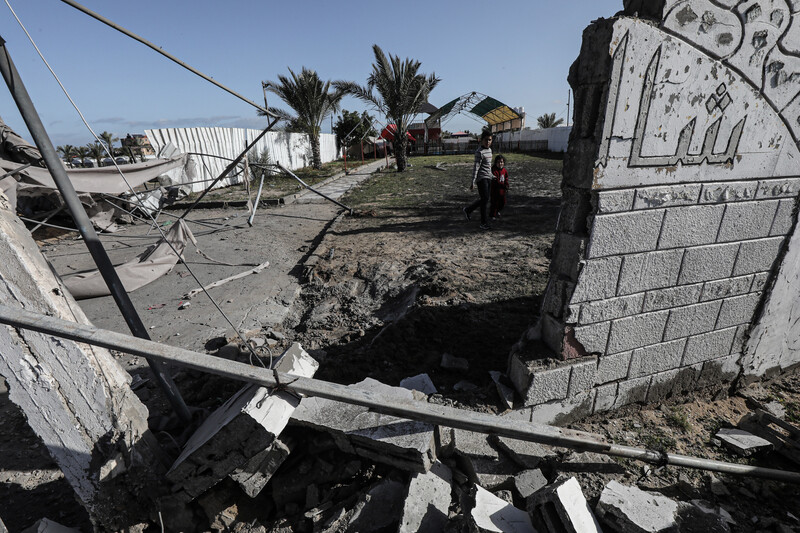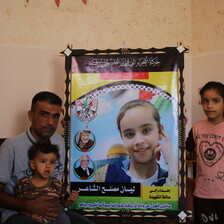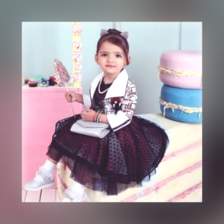The Electronic Intifada 12 March 2024

Love will endure despite all the destruction inflicted by Israel.
APA imagesLayan lay in a hospital bed with broken and burned limbs pieced together with external fixation metal rods, skin grafts and wound dressings.
Her injuries are such that Layan (not her real name) is immobilized in a prone position and cannot move except to turn her head from side to side, a half loop that moves her sight from a wall, across the bed sheet to a room filled with other women – like her – whose lives and bodies are forever shattered from Israeli bombs and bullets.
A woman sleeps on the floor next to Layan’s bed to look after her because the hospital is understaffed and stretched thin. I’ll call her Ghada to disguise her name.
It was immediately clear to me they are related, both of them in their early twenties. “Sisters,” they confirm.
Even at their worst, they are stunningly beautiful. For their safety, I will not describe their physical features, but they possess another kind of beauty that is only felt.
It is in the way they tenderly care for one another, joke and laugh in a world that repeatedly manufactures misery for them.
It is in how they welcomed me into their tight circle, waited for me daily to visit them, and eventually confided precious information to me, which they have now given me permission to narrate.
Nothing will be published without their prior approval. Identifying details are altered or omitted even though this is just a love story, because even Palestinian love is perceived as a threat.
Theirs is not an extraordinary love story, not the dramatic forbidden sort that makes for Shakespearean plays or films.
In fact, it’s common enough that it could be said to be boring. Except that the love of Layan’s life, her beloved husband Laith (not his real name), is a fighter in the Palestinian resistance, a group so vilified and dehumanized in popular Western discourse that most can scarcely imagine they might possess sensitivity or the capacity for love.
Ghada massages Layan’s neck and shoulders as I hold their shared mobile phone in her view, swiping through photos at Layan’s instruction.
They are pictures of her life with Laith in good times. Family gatherings, outings on the beach, loving embraces, happy poses, smiling selfies.
I realize both women have lost much weight and I imagine Laith has lost even more. In the photos, he is handsome with kind eyes that exude generosity.
The way he looks at Layan in some of the photos is achingly tender.
“Go back one picture,” Layan instructs me. “This is the day we got engaged” and a few more photos later, “this was on our honeymoon.”
She wants to tell me every detail about those days and I happily listen, watching her face open to the sun of memories that inhabit and animate her body as she speaks.
They look like any young couple – deeply in love, hopeful and full of dreams. They had saved up to build a modest home on their family land, borrowing a significant sum from the bank to finish construction.
Layan and Laith spent over a year picking out tiles, kitchen cabinets and other finishes. Laith came home one day with a cat he rescued from the street.
A week later, he brought an injured one. “I couldn’t just let it suffer and die,” he tells Layan when she protests.
The man Layan describes is a loving husband who wrote love letters to her and who would leave playful notes around the house for her to find while he was at work, all of which she saved in a plastic purple box along with longer love letters between them.
She describes a devoted son and brother who visited his mother daily and stood by his siblings through whatever life sent their way; a fun uncle adored by his nieces and nephews; a natural caretaker and protector who fed and watered stray animals in the street; a man rooted in the Islamic values of mercy and justice; a native son selflessly taking up arms to liberate his country from cruel foreign colonizers.
Theirs is a family of resolute commitment to national liberation, willing and ready to sacrifice for our shared homeland; for the simple dignity to pray in al-Aqsa mosque and roam the hills of their forefathers.
Deep faith
The couple tried unsuccessfully to conceive, and it bothers Layan not to have a baby yet. But she quickly shoos away disappointment, submitting to God’s will.
“Alhamdulillah,” she says.
Everyone returns to that phrase. God has a plan for each person and who are we to question it, she says.
Theirs is a family of deep faith in a society already deeply rooted in faith.
“We’re tired though,” people sometimes add. “It’s a lot.”
“Alhamdulillah,” again.
But I am enraged and often express a desire for God’s vengeance. They don’t.
“God will hold them to account in his own time,” Layan says.
They had been living in their new home less than a year when Israel began bombing Gaza. “I barely got to enjoy it,” Layan says.
They hadn’t known what was going to take place that day, but Laith knew he needed to pack up his family and send them off to safety before he would grab his rifle and head to battle. He made Layan promise to take their two cats.
“This isn’t the time for that,” she said. But he wouldn’t have it.
“Those are souls in our protection. They will not survive alone,” he said.
He kissed her forehead, an affirmation of inviolable love and devotion.
He kissed her lips, her cheeks, her neck. And she kissed him with the same forces stirring in her too.
They held each other in a long and tight embrace, vowing to find one another, by God’s will, if not in this life, then in the hereafter. A tearful Layan prayed for his safety, unceasingly beseeching God to protect her beloved.
She was still praying for him daily when I met her, five months since that painful farewell. She had gotten word that he had been captured by Israelis, but she didn’t know if he was alive or dead.
I understood, as she surely did, that he had at least been tortured and probably was still being tortured, but we did not speak of that knowledge, lest the utterance give it breath somehow.
It wouldn’t be long after their parting that Israel reduced their new home to rubble in a matter of seconds. Layan went back weeks later to see what she could retrieve from their lives.
Miraculously, the plastic purple box of their love letters had survived unscathed when everything else they possessed had been crushed.
Rescued from rubble
The sisters and their family moved a few times seeking safety, taking the cats each time, until the home where they were staying was targeted with a missile. It was late evening, most on the third-floor apartment were already asleep.
Ghada sat next to her mother, chatting as they often did before bed. She didn’t hear the missile. In fact, nearly everyone says that people inside a targeted home don’t hear the bomb. They say if you can hear it, then know you’re far enough away.
Instead, Ghada described seeing a flash of red light before feeling a weight on her back. Her arm was strangely twisted around her neck and over her head.
But there was no sound, until she began to hear the cracks of falling debris. She saw her limbs bouncing under the weight of broken concrete that hit and twisted her legs before her.
Dust burned and blinded her eyes. She tried to feel around for her mother, but she wasn’t sure her hand was actually moving.
“Ummi [my mother],” she called, but no response came.
She uttered the shahada, a Muslim’s final testament before God in the moments of death. But she was still alive, and soon she would hear her younger brother Qusai (not his real name) yelling, “is anyone alive?”
Layan experienced the moment differently. She actually heard the missile.
Typically, it makes a whooshing sound as it slices through the air, followed by a boom when it hits. Layan heard the whoosh and waited for the boom, which never came, confusing her.
Instead, a ringing in her ears pierced her thoughts. Her mouth was filled with gravel and dirt and she labored to spit it out.
She tried to move but could not, and in that moment realized she was buried in rubble. She uttered the shahada and waited for death, then heard her brother Qusai’s voice calling “is anyone alive?”
She cried out, “I’m here! I’m alive!” but she could not hear her own voice. Terror stricken, she tried again to call out, but again could not hear herself, unsure if she was alive or dead.
Again, she uttered the shahada and called out to her brother. The ringing in her ears subsided into a frightening internal silence.
She could hear rescuers moving about, but not her own voice, and believed she had become mute. She imagined a slow death under the rubble, alone in the cold and dark, no one able to hear her cries to save her.
“I must have passed out,” she says, “because the next thing I saw were several rescuers digging my body out of the rubble.”
“Our whole world”
Several members of their family were martyred that day. Israel murdered two of Layan’s siblings, cousins, aunts and uncles, their spouses and children, the two cats Layan promised to protect, and, most painfully, their mother.
“She was our whole world,” both Layan and Ghada tell me. They show me pictures of her, a beloved matriarch at the center and head of their close-knit family.
Ghada calls to her sometimes in her sleep, waking other women in the hospital room.
Again, the only possession that survived the second bomb was the plastic purple box of their love letters and notes.
“God spared our letters because our love is true, not just one bombing, but two!” she says, and adds, “I just want to know he’s okay.”
A week into my stay in Gaza, they called me to their corner of the hospital room as soon as I walked in from a long day elsewhere in Gaza. They are both giddy, smiles stretched across their beautiful faces.
“We’ve been waiting for you all day to tell you the good news!” they say, and I am excited and curious to hear.
She motions for me to come near. I bend my ear to her face, and she whispers, “Laith is alive. He’s in [withheld name] prison!”
I feel over the moon to know that this man I never met is alive, and I make pleas to God to protect him and bring him home to Layan. I pray for their reunion and feel honored to have been allowed to share in this rare moment of relief and hope at this hour.
Israeli television recently aired snuff videos of an unknown prison featuring systematic abuse and torture of Palestinians they’ve kidnapped. I wondered if Laith was among the men forced into degrading positions as Israelis spoke over them as if they were vermin.
I think about Laith when I read Western propaganda accounts of mass rape by Hamas. I know they are parroting Zionist lies, not only because they offer no evidence, and not only because honest journalists around the world have blown holes in their stories, most prominently the shameful New York Times feature co-written by a former Israeli military official who liked genocidal comments on social media, including one saying Israel needed to “turn the strip into a slaughterhouse.”
I know in my heart they are lies because, like most Palestinians, we understand the values that animate Hamas.
There is much one can criticize Hamas for, and many do. But rape, much less mass rape, is not one of them.
Even the biggest detractors of Hamas, including Israel, know such acts would never be tolerated among its ranks in the first place, and in the improbable circumstance that they happened, would be punished with expulsion and/or death.
May God protect Laith and every Palestinian fighter who left their family to sacrifice their lives for our collective liberation.
I will continue to imagine a day when he and Layan are together again, their home rebuilt in Gaza and filled with the patter of their children and the family gatherings of those who remain.
susan abulhawa is a writer and activist. She visited Gaza in February and early March.





